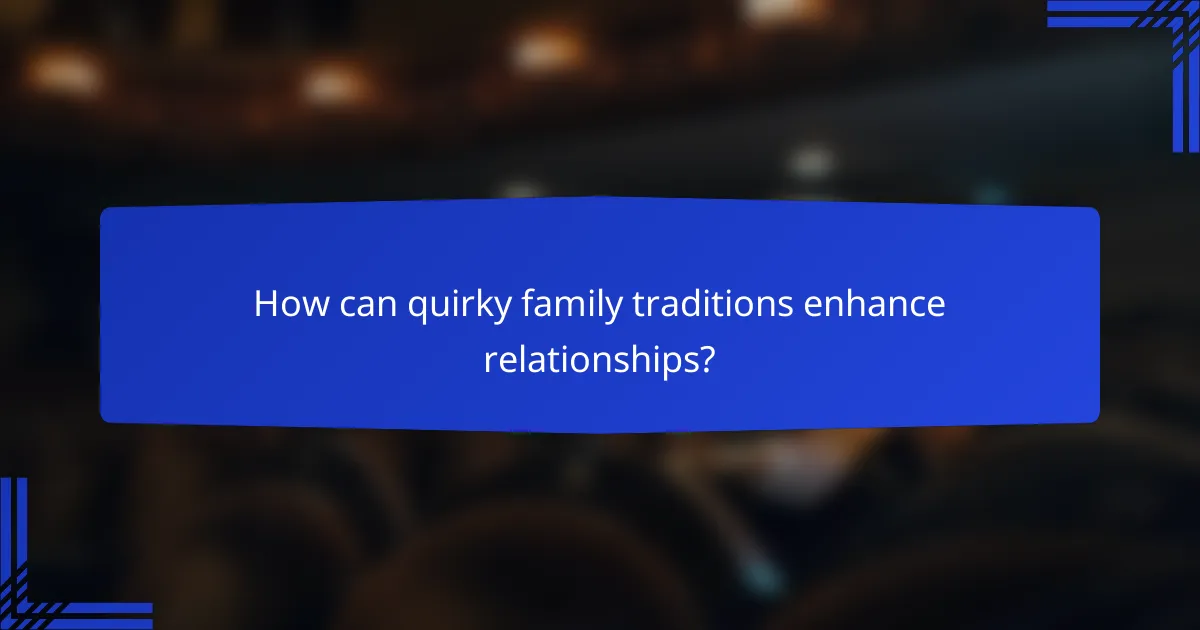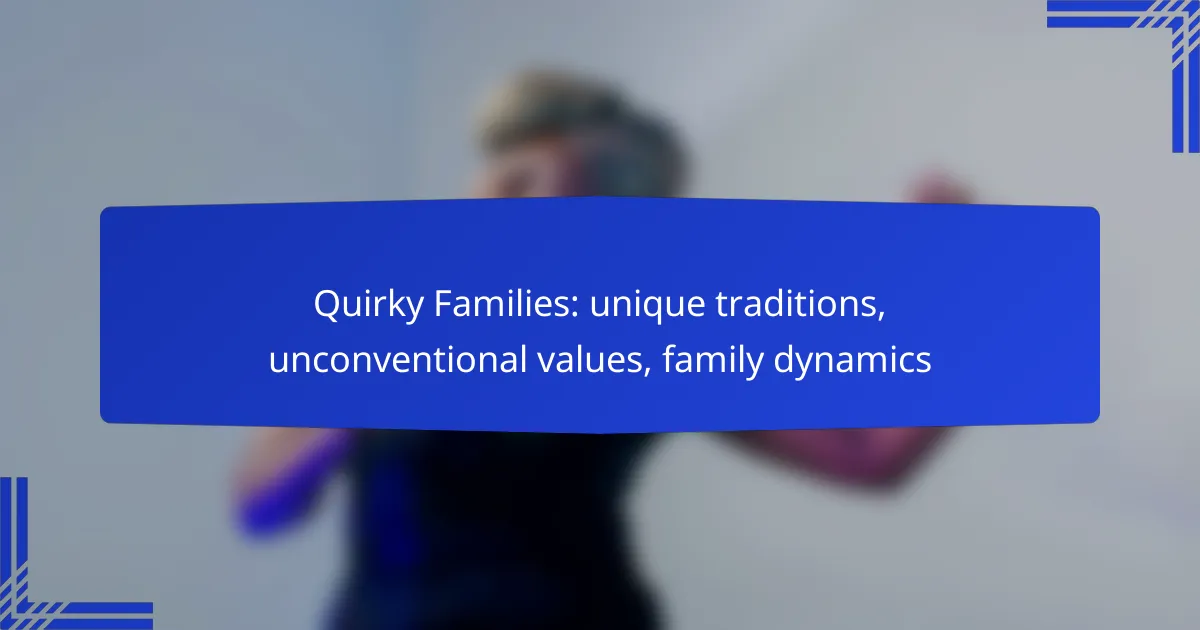Quirky families often stand out due to their unique traditions and unconventional values that shape their dynamics. By celebrating unusual holidays and engaging in creative rituals, these families foster strong bonds and a deep sense of belonging. Emphasizing individuality and open communication, they create an environment where each member can freely express themselves and thrive.

What unique traditions define quirky families in Canada?
Quirky families in Canada often embrace unique traditions that reflect their unconventional values and family dynamics. These traditions can range from celebrating unusual holidays to engaging in creative rituals that strengthen family bonds and foster a sense of belonging.
Celebration of unconventional holidays
Many Canadian families celebrate unconventional holidays that may not be widely recognized, such as “National Sibling Day” or “World Kindness Day.” These celebrations often involve special activities, themed meals, or family outings that highlight the importance of relationships and shared experiences.
For instance, a family might host a “Backwards Day,” where everyone wears their clothes backward and engages in activities in reverse order. This playful approach encourages creativity and laughter, making the day memorable for all family members.
Family storytelling nights
Family storytelling nights are a cherished tradition in many quirky Canadian households. During these evenings, family members gather to share personal stories, folklore, or even fictional tales, fostering a sense of connection and understanding among generations.
To make these nights more engaging, families can create themes, such as “adventures from childhood” or “tales of family history.” This practice not only entertains but also preserves family heritage and strengthens bonds through shared narratives.
Creative family rituals
Creative family rituals are integral to the identity of quirky families in Canada. These rituals can include anything from a weekly “family art night,” where everyone creates something unique, to a monthly “nature day,” dedicated to exploring local parks or trails together.
Establishing such rituals helps families cultivate traditions that reflect their values and interests. For example, families might create a “gratitude jar,” where members contribute notes of appreciation throughout the year, culminating in a special reading session during the holidays.

How do unconventional values shape family dynamics?
Unconventional values significantly influence family dynamics by fostering an environment where unique traditions and diverse perspectives thrive. Families that embrace these values often prioritize open communication and mutual respect, which can lead to stronger bonds and a greater sense of belonging.
Emphasis on individuality
In families that value individuality, each member is encouraged to express their unique traits and interests. This emphasis can manifest in various ways, such as celebrating personal achievements or allowing children to pursue their passions without strict expectations.
For example, a family may have a tradition where each member shares their personal goals during a monthly gathering. This practice not only promotes self-expression but also reinforces the idea that each person’s aspirations are valued and supported.
Acceptance of diverse lifestyles
Acceptance of diverse lifestyles within a family creates a welcoming atmosphere for different beliefs and practices. Families that prioritize this value often engage in discussions about various cultures, religions, and lifestyles, fostering understanding and empathy among members.
For instance, a family might celebrate holidays from multiple cultures, allowing everyone to learn and appreciate different traditions. This approach not only enriches family life but also prepares children to navigate a diverse world with respect and openness.

What are common characteristics of quirky family dynamics?
Quirky family dynamics often feature unconventional values and unique traditions that set them apart from typical family structures. These families prioritize individuality, creativity, and open-mindedness, fostering an environment where each member feels free to express themselves.
Open communication styles
Families with quirky dynamics tend to embrace open communication styles that encourage honesty and vulnerability. Members are often comfortable sharing their thoughts and feelings, which can lead to deeper connections and understanding among them.
For example, regular family meetings or informal discussions can help address issues and celebrate achievements. This transparency can create a supportive atmosphere where everyone feels heard and valued.
Flexible roles within the family
In quirky families, roles are often flexible, allowing members to take on various responsibilities based on their strengths and interests. This adaptability can lead to a more harmonious household, as tasks and duties are shared rather than rigidly assigned.
For instance, a child might take on cooking duties one week, while a parent handles grocery shopping. This fluidity not only fosters teamwork but also empowers each member to contribute in ways that resonate with their personal skills and passions.

How can quirky family traditions enhance relationships?
Quirky family traditions can significantly enhance relationships by fostering a sense of belonging and creating lasting memories. These unique practices encourage family members to connect on a deeper level, reinforcing bonds and promoting open communication.
Strengthening bonds through shared experiences
Shared experiences are fundamental to building strong family ties. Engaging in quirky traditions, such as themed family dinners or annual costume parties, allows members to create joyful memories together. These activities can range from simple game nights to elaborate holiday celebrations, providing opportunities for laughter and connection.
To maximize the impact of these shared experiences, families should prioritize inclusivity, ensuring that everyone feels involved and valued. Regularly revisiting these traditions can also help maintain a sense of continuity and stability within the family unit.
Encouraging creativity and expression
Quirky family traditions often encourage creativity and self-expression among family members. Activities like crafting unique holiday decorations or writing family stories can inspire individuals to showcase their talents and share their perspectives. This creative outlet not only enriches family life but also fosters a culture of acceptance and support.
To cultivate creativity, families can set aside dedicated time for these activities, allowing everyone to contribute their ideas. It’s essential to celebrate each member’s contributions, reinforcing the value of diverse expressions within the family dynamic.

What challenges do quirky families face?
Quirky families often encounter unique challenges stemming from their unconventional traditions and values. These challenges can include societal judgment, misunderstandings, and the difficulty of balancing their distinctive practices with contemporary norms.
Societal judgment and misunderstanding
Quirky families frequently face societal judgment, which can manifest as criticism or exclusion from more traditional social circles. This judgment may stem from a lack of understanding about their unconventional practices, leading to misconceptions about their values and lifestyle.
To navigate this challenge, quirky families can benefit from open communication about their traditions. Sharing the meaning behind their practices can foster understanding and acceptance among peers, reducing the likelihood of negative judgments.
Balancing tradition with modern values
Quirky families often struggle to balance their unique traditions with modern societal values. This can create tension, especially when younger family members feel pressure to conform to mainstream expectations while still wanting to honor their family’s distinctive practices.
Finding a middle ground is essential. Families can encourage discussions about which traditions are most meaningful and how they can adapt them to fit contemporary lifestyles. For example, a family tradition of weekly game nights can be maintained while incorporating new games that resonate with younger generations.

How can quirky families navigate societal expectations?
Quirky families can navigate societal expectations by fostering open communication and embracing their unique identities. By building supportive networks and staying true to themselves in public, they can create a balanced approach to family life that respects both their values and societal norms.
Building supportive community networks
Creating a supportive community is essential for quirky families to thrive. This can involve connecting with like-minded individuals or groups that share similar values and traditions. Local meetups, online forums, or family-oriented events can provide a sense of belonging and understanding.
Families should actively seek out resources such as parenting workshops or community centers that celebrate diversity. Engaging with others who appreciate unconventional lifestyles can help validate their experiences and reduce feelings of isolation.
Embracing authenticity in public spaces
Quirky families should embrace their authenticity in public by confidently expressing their values and traditions. This can include showcasing unique family customs during community events or openly discussing their unconventional choices with others. Being visible can inspire acceptance and understanding from the broader community.
However, it’s important to gauge the environment and choose appropriate moments for self-expression. Families might consider starting conversations with friendly neighbors or participating in local festivals to share their unique perspectives. This approach can foster positive interactions and help bridge gaps between different family dynamics.

What resources are available for quirky families in Canada?
Quirky families in Canada can access a variety of resources tailored to their unique traditions and values. These resources include community organizations, online platforms, and local events that celebrate diversity and unconventional family dynamics.
Community Organizations
Numerous community organizations across Canada focus on supporting unconventional families. These groups often provide workshops, social events, and networking opportunities that foster connections among families with similar values. For example, organizations like Family Services Canada offer resources specifically designed for diverse family structures.
Online Platforms
Online platforms serve as valuable resources for quirky families, offering forums, blogs, and social media groups where members can share experiences and advice. Websites like Quirky Families Network allow families to connect with others who embrace non-traditional lifestyles, providing a sense of belonging and support.
Local Events
Participating in local events can be a great way for quirky families to engage with their communities. Festivals celebrating diversity, family fairs, and workshops on unconventional parenting are often held in cities across Canada. These events not only provide entertainment but also promote understanding and acceptance of different family dynamics.
